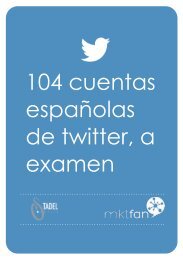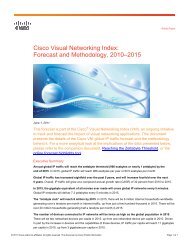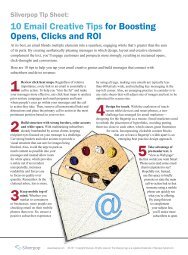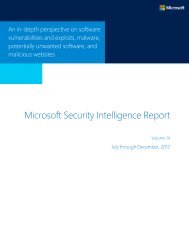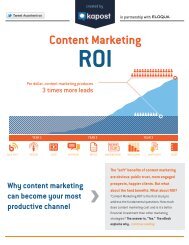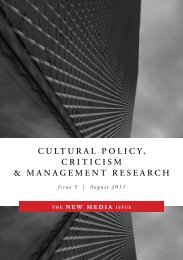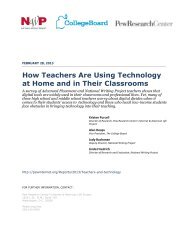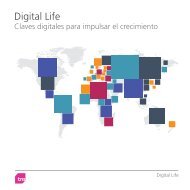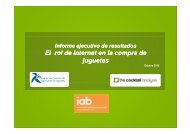Open Innovation 2.0 Yearbook 2013 - European Commission - Europa
Open Innovation 2.0 Yearbook 2013 - European Commission - Europa
Open Innovation 2.0 Yearbook 2013 - European Commission - Europa
Create successful ePaper yourself
Turn your PDF publications into a flip-book with our unique Google optimized e-Paper software.
The thrust of the recommendations for regional<br />
actors is that they need to make use of diverse<br />
<strong>European</strong> instruments such as Local Digital Agendas<br />
(LDAs), Regional <strong>Innovation</strong> Strategies based<br />
on smart specialisation (RIS3) and Territorial Pacts,<br />
in order to accelerate smart growth by fostering<br />
a new innovation mindset, strengthening entrepreneurial<br />
discovery, building on dialogue, enhancing<br />
collaboration and co-creativity, learning from best<br />
practice, and taking new actor groups on board in<br />
striving for societal innovation. For their part, EU<br />
and regional/local policymakers should actively<br />
create conditions in order to put a stronger focus<br />
on bottom-up policies and regional innovation<br />
ecosystem development, increase assistance for<br />
regions to run pilots and demonstration projects,<br />
and advance innovation cultures at the regional<br />
level through increasing entrepreneurial education<br />
at secondary school, vocational school and university<br />
levels.<br />
This resonates clearly with insights coming from<br />
the work of the New Club of Paris, with early results<br />
from Finland’s EUE (Energising Urban Ecosystems)<br />
programme, and the ideas actualised through ACSI<br />
(the Aalto Camp for Societal <strong>Innovation</strong>). Examples<br />
are described at greater length in the following<br />
sections.<br />
The practice of realising<br />
regional policy renewal<br />
Europe needs pioneering innovation regions<br />
Regional innovation ecosystems support larger<br />
national and pan-national innovation systems, and<br />
they can pioneer innovations of many kinds. They<br />
are essential learning arenas for building the future<br />
of Europe.<br />
Europe needs pioneering innovation regions.<br />
The CoR has called for pioneering regions to<br />
form <strong>European</strong> consortiums integrating different<br />
capabilities to create groundbreaking societal<br />
innovations for Europe-wide use. It also calls for<br />
increased performance capabilities of regions<br />
and cities to use the Horizon 2020 programme<br />
and other similar initiatives. The focus should be,<br />
in particular, on making full use of digitalisation<br />
and new key enabling technologies to modernise<br />
regional innovation policy. Furthermore, the CoR<br />
encourages the regions to move towards open<br />
innovation, within a human-centred vision of partnerships<br />
between public and private sector actors,<br />
with universities and other knowledge institutions<br />
playing a crucial role [7].<br />
A Europe built on innovative regions is a Europe<br />
of many possibilities, resilient in the face of societal<br />
challenges, global competition and financial<br />
uncertainty. A Europe of diverse regions can leverage<br />
diversity, moving at different speeds along<br />
diverse paths in the future. This is the reality that<br />
an <strong>Innovation</strong> Union faces. Within this diversity, different<br />
regions will play different roles on the road<br />
ahead. One role of crucial importance is that of<br />
the pioneer, the region that explores new ground,<br />
sets examples, shows the way, and prepares the<br />
ground for others. Pioneering innovative regions<br />
can take advantage of their capacity to experiment<br />
and their drive to excel, to become forward camps<br />
on the journey that other regions will eventually<br />
make from local improvements to regional welfare,<br />
a journey that builds <strong>European</strong> prosperity through<br />
balanced contributions.<br />
Pioneers establish themselves in previously<br />
unknown environments — be they physical, cognitive<br />
or conceptual territories — and discover how to<br />
engage the actors in experiments aimed at making<br />
the territory fertile ground for further development.<br />
They are innovators, restless by nature: ‘boldly going<br />
where none have gone before’ is characteristic of<br />
the pioneer temperament. But moving ahead of<br />
events into the future is not the only thing pioneers<br />
do: they also know they must first learn how the<br />
worlds they explore could actually work. New knowledge<br />
is turned into daily practice. Their experiments<br />
may not always succeed but when they do, they<br />
result in a better quality of life, concrete examples<br />
and scalable processes, preparing the way for others<br />
to follow. So they stay to reap the early rewards<br />
before moving on. In this sense, ‘boldly going’ goes<br />
hand in hand with ‘boldly staying’. And others do follow,<br />
translating lessons learned into daily practice.<br />
In this way, impossible dreams become possible.<br />
Translating these metaphors to actual regional ecosystems<br />
requires courage, curiosity and creativity<br />
skill sets. Resistance to change can be widespread,<br />
even where major business and government stakeholders<br />
acknowledge the importance of innovation.<br />
Pioneering is a challenge, and following after is easier<br />
than the initial pathfinding. The knowing–doing gap<br />
must be bridged: producing policy papers and wellwrought<br />
strategic planning reports is not the same as<br />
realising them in practice. Collaboration provides its<br />
own obstacles: the need for trust, respect and mutual<br />
understanding among partners; speeding up is easier<br />
alone than in tandem. The gravity that keeps our feet<br />
on solid ground can often translate into reluctance<br />
to experiment or boldly act, and must, at times, be<br />
overcome. None of this is ever easy.<br />
89



